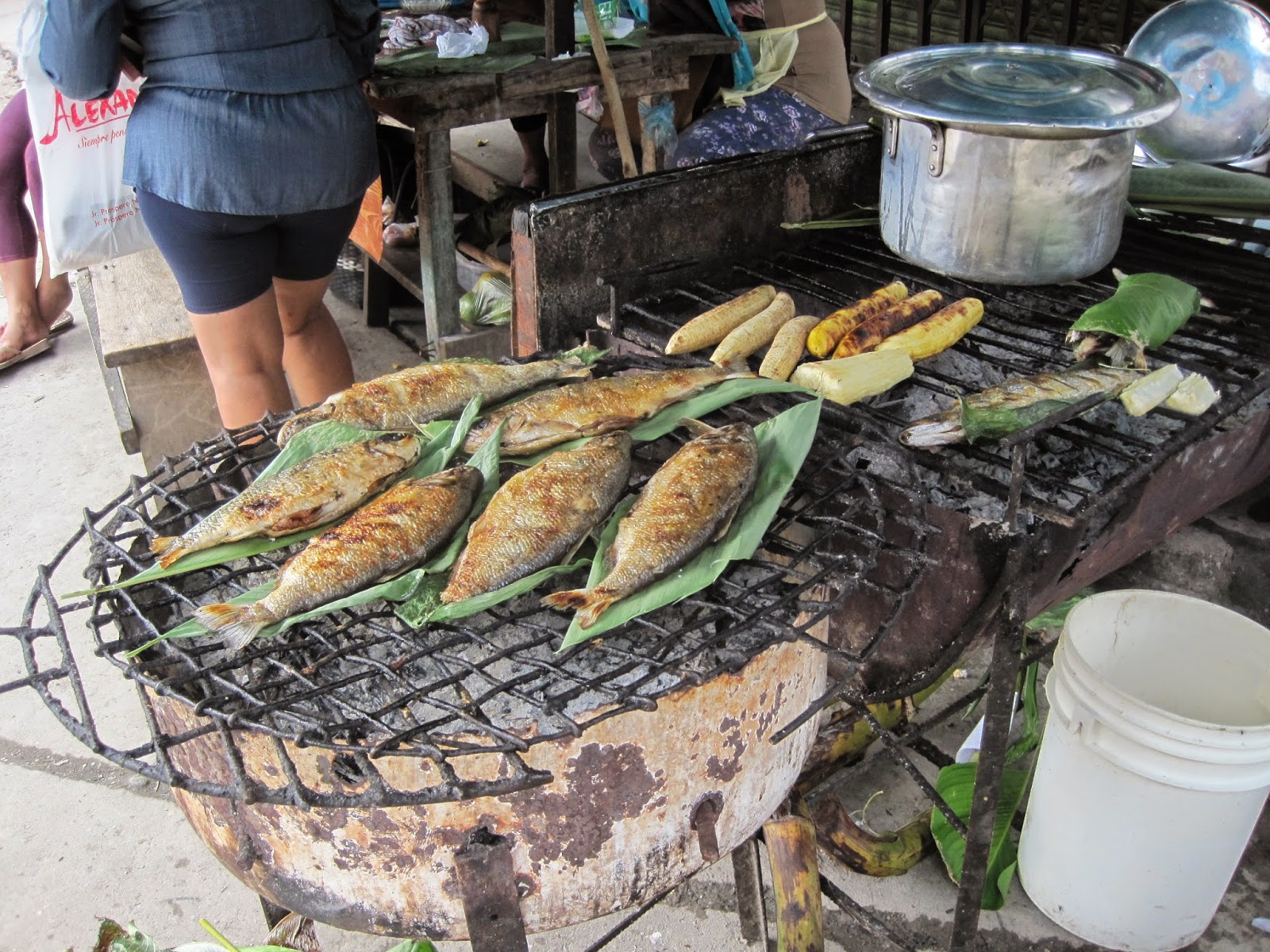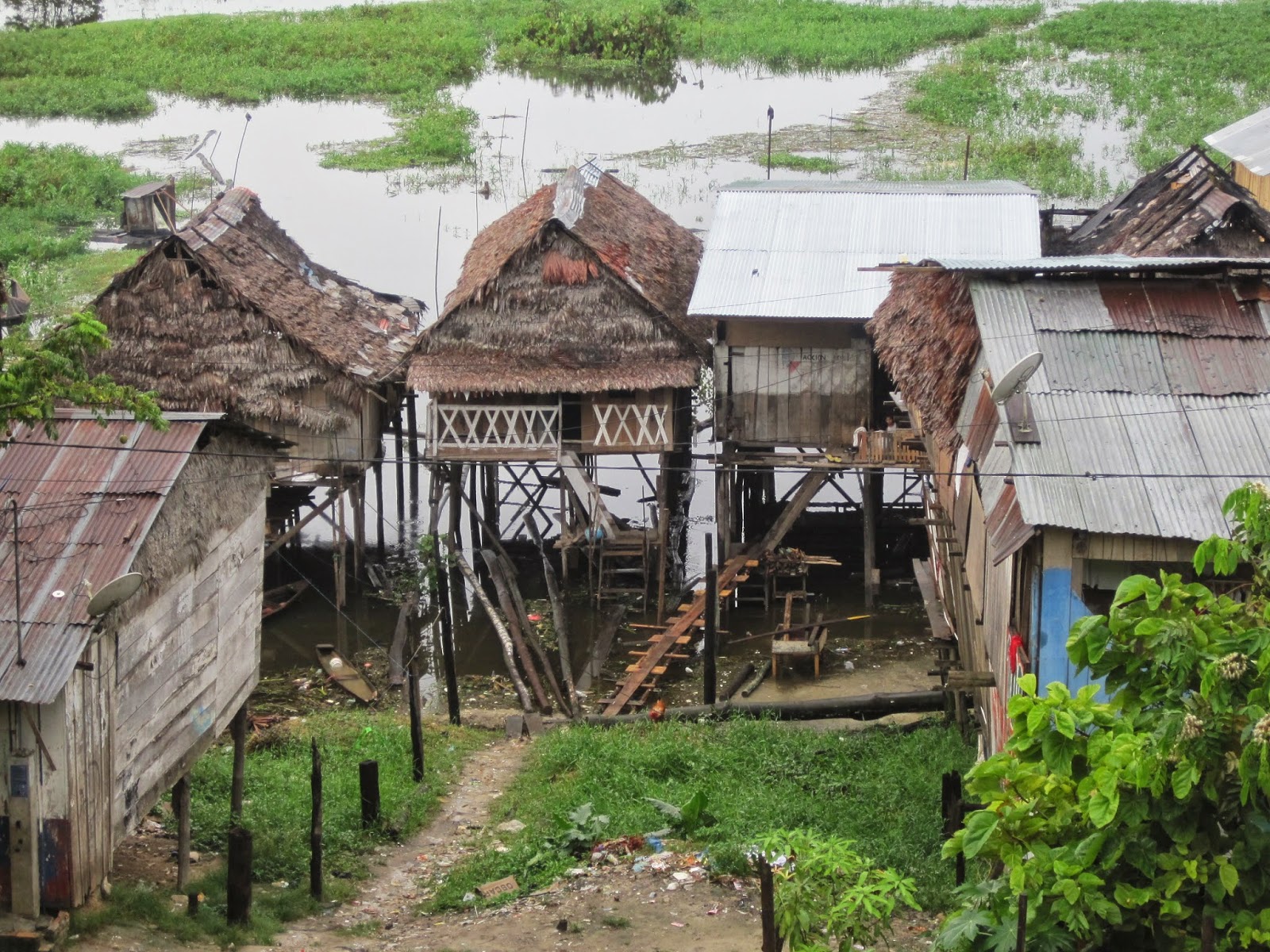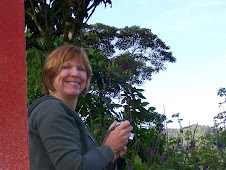One of the most amazing things that we did while on the Earthwatch Amazon Expedition was the Pink River Dolphin surveys. We quietly floated down the river and observed and counted the dolphins. We noted their GPS location and noted whether they were traveling, resting or fishing. The dolphins are a good indicator of the health of the river because they will only stay as long as there are fish to eat. They have no natural predators. Even the local people will not hunt them because of long held superstitions. This is a short video of the experience. In the background you can hear a toucan calling.
https://www.youtube.com/watch?v=I4SfZVUY_fQ
Tuesday, September 16, 2014
Earthwatch... the Amazon
We left the city of Nauta and began our boat trip down the Maranon River. The river, an extension of the Amazon River, was wide and brown. There were boats of many kinds carrying bananas or travelers to the city of Nauta or Iquitos. After many hours we came to the Samiria River, our destination. Here the water turns black and calm. The tanins from the forest vegetation turn the water black and the surface becomes a mirror, reflecting the forest on the banks. This area is protected as a reserve so we had to check in at the park entrance and obtain permission to proceed. Once in the Samiria there is no commercial traffic, only the small dugout canoes of the locals. We spent the night at the first stop and then continued for the next day to stop number two, where we spent the next week and a half. Our ship, the Ayapua, remained docked and each day we took auxiliary boats on excursions to do wildlife surveys.
We did Bird counts of Water Birds and Macaws. We counted species and numbers of birds that we observed as our small boat drifted on the river.
We went fishing and counted weighed and measured the species of fish we caught both on fishing poles and in the nets.
We observed River Dolphins and counted them and recorded their behavior as we floated on the Samira River and the small channel that led to the Tuna Lake.
We went on walks on the land in the jungle observing and counting the land mammals we encountered.
We boarded the boats at night and searched by lamplight the shores of the river for caimen. When we could we captured and measured the caimen. At night we also looked for and recorded Fishing Bats.
Each evening we returned to the ship and recorded our findings on the computer, showered and visited the bar to compare our findings of the day. At seven we had dinner and a debriefing of the days events and maybe a lecture or movie. We signed up for the next days excursions and by nine, exhausted we retired to our rooms.
We did Bird counts of Water Birds and Macaws. We counted species and numbers of birds that we observed as our small boat drifted on the river.
We went fishing and counted weighed and measured the species of fish we caught both on fishing poles and in the nets.
We observed River Dolphins and counted them and recorded their behavior as we floated on the Samira River and the small channel that led to the Tuna Lake.
We went on walks on the land in the jungle observing and counting the land mammals we encountered.
We boarded the boats at night and searched by lamplight the shores of the river for caimen. When we could we captured and measured the caimen. At night we also looked for and recorded Fishing Bats.
Each evening we returned to the ship and recorded our findings on the computer, showered and visited the bar to compare our findings of the day. At seven we had dinner and a debriefing of the days events and maybe a lecture or movie. We signed up for the next days excursions and by nine, exhausted we retired to our rooms.
Village along the river
My favorite vantage point
The Samiria River
Wildlife Survey
Sloth
Coming home to the Ayapua
Bats
Red Howler
Butterflies
Bird Survey on Lake Atun
Land Survey
Entering data on the computer
Fishing for ...
Piranha
Black Collared Hawk
Sunset in the Amazon
This trip was magical. The Amazon will forever be in my heart.
Saturday, July 5, 2014
The Ayapua
On our Earthwatch expedition we were lucky to be stationed aboard the Ayapua, a restored rubber boom era ship with many parts reclaimed from the ship used in the filming of the movie Fitzcarraldo. It was originally built in Brazil and used to carry rubber out of the Amazon. To be on such a historically important ship was a treat in itself. After our trip the ship was to be used in the marine museum in Iquitos. Here are a few pictures of my home for two weeks.
The Ayapua docked at Nauta
The Stairway
The Dining Room/ Meeting Room
My Bedroom
Stairways up and down
Smokestacks and funnels from the Molly Aida
The Library
The Helm
The Bar
The Ayapua docked on the Samiria River
An auxillary boat
Home
The Ayapua docked at Nauta
The Stairway
The Dining Room/ Meeting Room
My Bedroom
Stairways up and down
Stairway reclaimed from the Molly Aida of Fitzcarraldo fame
Smokestacks and funnels from the Molly Aida
The Library
The Helm
The Bar
The Ayapua docked on the Samiria River
An auxillary boat
Home
Everytime we went out on an auxiliary boat for an expedition, it was such a wonderful feeling to see this ship come into view and know that we were home.
Amazon Riverboat Exploration
In the beginning of February, 2014 I went on an Earthwatch expedition to the Amazon River. The trip began in the Peruvian city of Iquitos. Historically this town was the center of the Rubber Boom Era in the early 1900's when the Amazon Rainforest was exploited for the harvesting of rubber to supply the demands of rubber for tires for the newly invented automobile. The local Indians were used as slaves to harvest the rubber and the rubber barons became rich and powerful. They built lavish homes and built steamships to carry the rubber out of the forest. When the demand for rubber subsided because it was deemed more profitable to farm rubber in a more hospitable environment, the city fell into disrepair and was reclaimed by the local people. Iquitos is a fascinating city at the gateway to the Amazon River. For hundreds of years the locals have lived in floating houses. There are crowded outdoor markets, curbside restaurants and buzzing traffic of unique motorcycle taxis. I have never been to a more unique city. I spent 2 nights at Casa Moray, a restored rubber baron mansion. There I was joined by my fellow adventurers and our leader Dr. Richard Bodmer to begin our foray into the Amazon.
Casa Moray
Casa Moray
Amazon Longboats
Fish seller at Belen Market
Street Food... Grubs!
Belen Market...Floating City in the background
Street Food
Floating Houses
Floating Houses
Iquitos Taxi
Remnant of another era
Friday, March 22, 2013
Amalfi Coast
It so happened that our ship was to be in Naples on George's birthday. I decided to buy for him a private tour of the Amalfi Coast. I booked it in advance with Sorrento Topcar. We were picked up at 8:30 AM at the port by Julia and taken on a wonderful tour of Positano, Amalfi and Ravello.
The drive was magical. The Italian coastline is gorgeous and the small towns built into the mountains are lovely. Around every corner there was a beautiful view begging a stop to take pictures. It was heaven to have the luxury of a private driver who would stop whenever we wanted.
The day was just ever the bit foggy, but it seemed to lend to the feeling of mystical loveliness.
The road wove around every corner looking down on little fishing villages, small towns and trendy summer resorts and hotels.
Our first stop was Positano, a town very popular with the rich and famous for its unique clothing stores and boutique hotels. Small winding roads leading into the town make it inaccessible for big tour buses.
Then on to Amalfi, a much more crowded and busy town. Since the access to this town is wider it attracted many more buses filled with tourists. Here there are many more shops and restaurants. There is the Amalfi cathedral and the large central square.
Of course there were lemons and Limoncello and just about everthing lemon everywhere for sale. The Amalfi Coast is famous for its lemons.
Like so many towns in Europe there was no lack of tiny winding streets lined with little shops selling everything from fruits and vegetables to souvineers.
The drive continued along along the breathtaking coast to Ravello.
Here we visited the beautiful Villa Rufolo, a lovely old Villa built in the 13th century by the wealthy Rufolo family. While the buildings are mostly in ruins they are a reminder of the affluence of times gone by. The gardens overlooking the Mediterranean Sea were lovely.
The ride back to the port took us past Pompei, a destination for another trip, and the city of Naples.
If I have any advice for the cruise traveler in this area, it would be to skip the cruise ship excursion and book a private trip with Sorrento Top car at http:sorrentotopcar.com/. The price was reasonable and the service was excellent. The personalized attention and access to areas unvisited by the big tour buses was priceless. This visit to Naples and the Amalfi Coast will be forever one of my favorite trips.
Subscribe to:
Posts (Atom)
























































